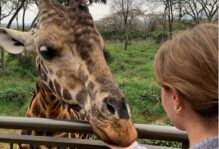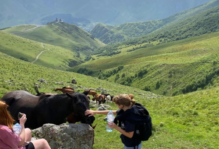Catalyzing Global Climate Resilience: Working at an Impact Innovation Firm in Nairobi
By Amy Browning ‘26
The Global Research Institute’s Summer Fellows Program provides international experiential learning opportunities to W&M students. This post is one installment of a series highlighting the 2023 Fellows’ key discoveries and formative experiences.
When I first arrived in Nairobi, I was surprisingly more relaxed than I expected. It was my first time living abroad, my Swahili skills were practically non-existent, I barely knew how to reach my flat in Kileleshwa, and my summer in Kenya was just beginning. Yet, the thrill of new experiences was quickly taking the edge off of jet lag. I found the people to be welcoming and patient as I settled into my new life, and I became eager to start my work at BFA Global, an impact innovation firm with a focus on climate resiliency.
As a Global Research Institute Fellow, I was placed in the Nairobi office of BFA Global to primarily assist the upcoming TECA (Triggering Exponential Climate Action) climate-tech venture launcher wave. TECA aims to launch 100 ventures by 2026 to bolster the climate resilience of vulnerable communities, and contribute to bettering the planet through environmental and fintech innovation. Fellows in each wave can be selected even before they have an idea for a company, and are supported by the BFA Global team and TECA community to develop scalable ideas on a streamlined timeline. For the first few weeks, I got acclimated to the company culture and project objectives, before beginning talent sourcing and ecosystem mapping for TECA’s second wave, centered on the Blue Economy.
I learned how talent investing can bolster local communities and optimize business results, and what the ingredients for success are in entrepreneurship and venture development within the climate space. Talent investing is a relatively new approach to venture building, in which investors have greater focus on an individual’s expertise and potential to excel in a sector, rather than the rigidity of an established business. This people-centered approach allows venture builders to feel confidence in the founders behind ideas, and contribute tailored support to ensure they maximize their talent. Working at TECA allowed me to contribute to this process by evaluating which skill sets and prior experiences in fellows would be most applicable to the program. I researched and held numerous meetings with partners and potential applicants and recruiters alike, gathering feedback on the program logistics and being the primary point of contact for the next wave of innovation. This work set the foundation for wave two, and continued to build the TECA community to prepare for future waves. These waves will expand user-centric climate resilience ventures outside of the blue economy space to areas like regenerative agriculture, urban heat islands, and reforestation — aiming to tackle a variety of issues central to climate-vulnerable communities.

Reese and one of our flatmates hiking ahead of me on Mount Longonot. Note to future fellows: think about bringing hiking shoes!
While I was adjusting to my new role, I was also adjusting to my new life in the city. My co-fellow, Reese, and I lived in a flat that was a short walk to our work and the Nairobi arboretum, which came in handy on weekends. We found our favorite grocery store, learned how to use the mobile money system (MPESA — which was more common than using cash or card, and more convenient), set up our new phone numbers, and explored our surroundings. In our free time we visited the Giraffe Centre, walked (not hiked, as our co-workers would remind us) in Karura Forest, navigated the Central Business District, and connected with a local ultimate frisbee team in the arboretum.
Like most experiences in life, the people I was surrounded by impacted me just as much, if not more, than the unfamiliar and exciting setting. I was fortunate enough to live in a flat with four other expats, each working in Nairobi for very different reasons, and each with a plethora of advice and companionship to offer. They accompanied me on a variety of adventures — from a 13.5 km hike up and around Mount Longonot, exploring city nightlife, cheering on our flatmate’s 10k, touring local cuisine, to learning how to salsa dance — making me very grateful to have such a strong support system.
I was astounded by the number of people I met and developed friendships with in Nairobi outside of my work and flat. I grabbed a meal with a woman I sat next to on my flight to NBO, met a girl who I surprisingly shared a mutual friend with back in Virginia, visited the home of a tuk tuk driver in Diani, and connected with local college students I met dancing. I often found myself at the brink of my comfort zone, debating whether I should stick to what I knew or push myself into the unknown. Challenging myself to say yes to opportunities I might have initially refused in the familiarity of my home or school life allowed me to grow into a mindset I know will be useful as I navigate my future goals of living and working abroad.
I was also able to go outside of Nairobi. Toward the end of our summer, Reese and I decided to make the most of weekends and go on safaris to Amboseli National Park and Masai Mara National Reserve, as well as Diani on the Kenyan coast. I never thought I would be able to see such beautiful wildlife and scenery.

Seeing an elephant at Masai Mara. The reserve was absolutely breathtaking.
Of course, the professional skills gained through working at a global impact innovation firm were also a major highlight of my time in Nairobi. As the summer progressed, my co-fellow and I were encouraged to branch out and gain experience working on other projects BFA Global was spearheading. In our weekly team meetings, our co-workers would rattle off their main objectives (anything from completing field work in climate-vulnerable communities, to closing contracts with partners on digital finance initiatives, to the playful plea to join the Nairobi City Marathon), which opened me up to thinking about career possibilities and interests I hadn’t yet been exposed to. Reese and I became involved with the Universal Climate Insurance (UCI) project, researching communities in the Global South which are particularly climate vulnerable and have (or could have) mobile banking platforms to directly distribute monetary relief in times of climate crises. We found partner organizations that could assist in collecting individual donations or allocating a portion of company sales/financial transactions to the fund. I am excited to see where UCI will be piloted and witness the results of such a unique platform aimed at connecting corporations and consumers with large carbon footprints to those who are the most susceptible to climate disasters, and who have contributed the least to global greenhouse gas emissions.

Reese and I with a few of our co-workers in the BFA Global office.
On our last day of work at BFA Global we ate freshly caught fish — ordered from a first wave TECA venture — with our co-workers, and reminisced on our time in Kenya. I will always remember this summer fondly, and aspire to return to Nairobi someday to work. I am forever thankful to the GRI for this incredibly impactful experience.




No comments.